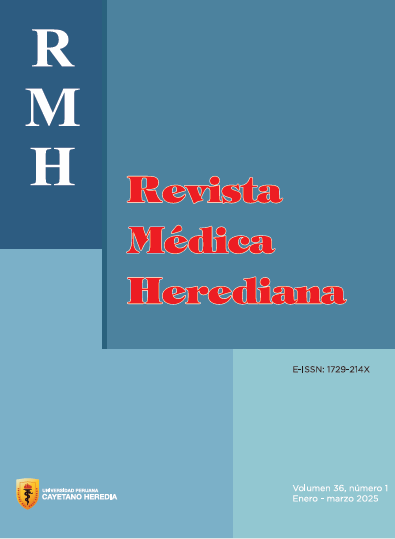Evaluación del ADN circulante tumoral en cáncer de mama
DOI:
https://doi.org/10.20453/rmh.v36i1.5441Palabras clave:
ADN, neoplasias de la mama, sobrevida, pronósticoResumen
El ADN circulante tumoral (ADNct) evalúa componentes celulares de las neoplasias a través del plasma. El cáncer de mama (CM) es la neoplasia más frecuente y el estudio del ADNct permite obtener información de la neoplasia de forma mínimamente invasiva. Los pacientes con CM tienen niveles más altos de ADNct que los sujetos sin diagnóstico de cáncer. La detección y los niveles altos de ADNct son más frecuentes en los pacientes con enfermedad metastásica con mayor volumen tumoral y con enfermedad agresiva, como el fenotipo triple negativo y HER2+. El ADNct permite seleccionar el tratamiento dirigido adecuado en la enfermedad metastásica. En el CM temprano, la eliminación del ADNct durante la quimioterapia neoadyuvante se ha asociado con tasas más altas de respuesta patológica completa y una sobrevida prolongada; además, predice la recaída con varios meses de antelación.
Descargas
Citas
Jahr S, Hentze H, Englisch S, Hardt D, Fackelmayer FO, Hesch RD, et al. DNA fragments in the blood plasma of cancer patients: quantitations and evidence for their origin from apoptotic and necrotic cells. Cancer Res. 2001;61(4):1659–65.
Lo YMD, Chiu RWK. Genomic analysis of fetal nucleic acids in maternal blood. Annu Rev Genomics Hum Genet. 2012; 13:285–306. doi: 10.1146/annurev-genom-090711-163806
Mouliere F, Robert B, Arnau Peyrotte E, Del Rio M, Ychou M, Molina F, et al. High fragmentation characterizes tumour-derived circulating DNA. PloS One. 2011;6(9):e23418. doi: 10.1371/journal.pone.0023418
Liang DH, Ensor JE, Liu Z bin, Patel A, Patel TA, Chang JC, et al. Cell-free DNA as a molecular tool for monitoring disease progression and response to therapy in breast cancer patients. Breast Cancer Res Treat. 2016; 155:139–49. doi: 10.1007/s10549-015-3635-5
Xu B, Shan G, Wu Q, Li W, Wang H, Li H, et al. Concordance of genomic alterations between circulating tumor DNA and matched tumor tissue in Chinese patients with breast cancer. J Oncol. 2020 Aug 27; 2020:4259293.. doi: 10.1155/2020/4259293
Diehl F, Schmidt K, Choti MA, Romans K, Goodman S, Li M, et al. Circulating mutant DNA to assess tumor dynamics. Nat Med. 2008;14(9):985–90. doi: 10.1038/nm.1789.
Arpino G, Bianchini G, Malorni L, Caputo R, Zambelli A, Puglisi F, et al. 199P Correlation of circulating tumor DNA (ctDNA) or thymidine kinase activity (TKa) dynamic patterns with tumor response in patients (pts) with hormone receptor (HR)+ human epidermal growth factor 2 (HER2)–advanced breast cancer (ABC) on ribociclib (RIB)+ letrozole (LET) in BioItaLEE trial. ESMO Open. 2023;8(1): 101388. DOI: 10.1016/j.esmoop.2023.101388
Andre F, Solovieff N, Su F, Bardia A, Neven P, Yap YS, et al. Abstract P5-02-14: Identification of mechanisms of acquired resistance to ribociclib plus endocrine therapy using baseline and end-of-treatment circulating tumor DNA samples in the MONALEESA-2,-3, and-7 trials. Cancer Res. 2023;83(5_Supplement):P5-02.
Goetz MP, Hamilton EP, Campone M, Hurvitz SA, Cortes J, Johnston S, et al. Landscape of baseline and acquired genomic alterations in circulating tumor DNA with abemaciclib alone or with endocrine therapy in advanced breast cancer. Clin Cancer Res. 2023;OF1–12. doi: 10.1158/1078-0432.CCR-22-3573.
Garcia-Murillas I, Chopra N, Comino-Méndez I, Beaney M, Tovey H, Cutts RJ, et al. Assessment of molecular relapse detection in early-stage breast cancer. JAMA Oncol. 2019;5(10):1473–8. doi: 10.1001/jamaoncol.2019.6325.
Riva F, Bidard FC, Houy A, Saliou A, Madic J, Rampanou A, et al. Patient-specific circulating tumor DNA detection during neoadjuvant chemotherapy in triple-negative breast cancer. Clin Chem. 2017;63(3):691–9. doi: 10.1373/clinchem.2016.262337.
Dressman D, Yan H, Traverso G, Kinzler KW, Vogelstein B. Transforming single DNA molecules into fluorescent magnetic particles for detection and enumeration of genetic variations. Proc Natl Acad Sci. 2003;100(15):8817–22. doi: 10.1073/pnas.1133470100.
Chae YK, Davis AA, Jain S, Santa-Maria C, Flaum L, Beaubier N, et al. Concordance of genomic alterations by next-generation sequencing in tumor tissue versus circulating tumor DNA in breast cancer. Mol Cancer Ther. 2017;16(7):1412–20. doi: 10.1158/1535-7163.MCT-17-0061.
Payet-Meza E, Peerez-Mejia P, Poquioma-Rojas E, Díaz Nava E, Rojas Vilca J. Registro de cáncer de lima metropolitana. incidencia y mortalidad 2013–2015 [Internet]. Lima: Instituto Nacional de Enfermedades Neoplasicas; [citado 6 de julio 2022]. Disponible en: https://portal.inen.sld.pe/wp-content/uploads/2022/01/REGISTRO-DE-CANCER-DE-LIMA-METROPOLITANA-2013-2015.pdf
Woodhouse R, Li M, Hughes J, Delfosse D, Skoletsky J, Ma P, et al. Clinical and analytical validation of FoundationOne Liquid CDx, a novel 324-Gene cfDNA-based comprehensive genomic profiling assay for cancers of solid tumor origin. PloS One. 2020;15(9):e0237802. doi: 10.1371/journal.pone.0237802.
Abbasi HQ, Maryyum A, Khan AM, Shahnoor S, Oduoye MO, Wechuli PN. Advancing precision oncology in breast cancer: the FDA approval of elacestrant and Guardant360 CDx: a correspondence. Int J Surg. 2023;109(7):2157–8. doi: 10.1097/JS9.0000000000000334
Janni W, Friedl T, Rack B, Fasching PA, Hartkopf A, Tesch H, et al. Abstract PS06-06: Analysis of ctDNA for the detection of minimal residual disease (MRD) using a tissue-free, multiomic assay in patients with early-stage breast cancer. Cancer Res. 2024;84(9_Supplement):PS06-06.
Aftimos P, Oliveira M, Irrthum A, Fumagalli D, Sotiriou C, Gal-Yam EN, et al. Genomic and Transcriptomic Analyses of Breast Cancer Primaries and Matched Metastases in AURORA, the Breast International Group (BIG) Molecular Screening Initiative. Cancer Discov. 2021 Nov 1;11(11):2796–811. doi: 10.1158/2159-8290.CD-20-1647.
Davis AA, Jacob S, Gerratana L, Shah AN, Wehbe F, Katam N, et al. Landscape of circulating tumour DNA in metastatic breast cancer. EBioMedicine. 2020;58: 102914. doi: 10.1016/j.ebiom.2020..
Li X, Lu J, Zhang L, Luo Y, Zhao Z, Li M. Clinical implications of monitoring ESR1 mutations by circulating tumor DNA in estrogen receptor positive metastatic breast cancer: a pilot study. Transl Oncol. 2020;13(2):321–8. doi: 10.1016/j.tranon.2019.11.007.
Urso L, Vernaci G, Carlet J, Lo Mele M, Fassan M, Zulato E, et al. ESR1 gene mutation in hormone receptor-positive HER2-negative metastatic breast cancer patients: concordance between tumor tissue and circulating tumor DNA analysis. Front Oncol. 2021;11:625636. doi: 10.3389/fonc.2021.625636.
Gerratana L, Davis AA, Velimirovic M, Clifton K, Hensing WL, Shah AN, et al. Interplay between ESR1/PIK3CA codon variants, oncogenic pathway alterations and clinical phenotype in patients with metastatic breast cancer (MBC): comprehensive circulating tumor DNA (ctDNA) analysis. Breast Cancer Res. 2023;25(1):112. doi: 10.3389/fonc.2021.625636.
Castaneda CA, Castillo M, Bernabe LA, Suarez N, Romero A, Sanchez J, et al. Association between PIK3CA Mutations in Blood and Tumor-Infiltrating Lymphocytes in Peruvian Breast Cancer Patients. Asian Pac J Cancer Prev. 2022;23(10):3331-3337. doi: 10.31557/APJCP.2022.23.10.3331
Gomez HL, Castaneda CA, Castillo M, Reuben J, Gao H, Suarez N, et al. Concurrent Detection of Circulating Tumor Cells and Circulating Tumor DNA in Triple-negative Breast Cancer. Asian Pac J Cancer Care. 2021;6(4):373–7. doi: 10.31557/apjcc.2021.6.4.373-377
O’Leary B, Cutts RJ, Huang X, Hrebien S, Liu Y, André F, et al. Circulating tumor DNA markers for early progression on fulvestrant with or without palbociclib in ER+ advanced breast cancer. J Natl Cancer Inst. 2021;113(3):309–17. doi: 10.1093/jnci/djaa087.
O’Leary B, Hrebien S, Morden JP, Beaney M, Fribbens C, Huang X, et al. Early circulating tumor DNA dynamics and clonal selection with palbociclib and fulvestrant for breast cancer. Nat Commun. 2018; 9(1):896. doi: 10.1038/s41467-018-03215-x.
Pascual J, Gil-Gil M, Proszek P, Zielinski C, Reay A, Ruiz-Borrego M, et al. Baseline mutations and ctDNA dynamics as prognostic and predictive factors in ER-positive/HER2-negative metastatic breast cancer patients. Clin Cancer Res. 2023; 29(20):4166-4177. doi: 10.1158/1078-0432.CCR-23-0956.
André F, Su F, Solovieff N, Hortobagyi G, Chia S, Neven P, et al. Pooled ctDNA analysis of MONALEESA phase III advanced breast cancer trials. Ann Oncol. 2023;34(11):1003–14. doi: 10.1016/j.annonc.2023.08.011.
André F, Solovieff N, Su F, Bardia A, Neven P, Yap Y, et al. Acquired gene alterations in patients treated with ribociclib plus endocrine therapy or endocrine therapy alone using baseline and end-of-treatment circulating tumor DNA samples in the MONALEESA-2, -3, and-7 trials. Ann Oncol. 2025 Jan;36(1):54-64. doi: 10.1016/j.annonc.2024.09.010. Epub 2024 Sep 21.
Tolaney SM, Toi M, Neven P, Sohn J, Grischke EM, Llombart-Cussac A, et al. Clinical significance of PIK3CA and ESR1 mutations in circulating tumor DNA: analysis from the MONARCH 2 study of abemaciclib plus fulvestrant. Clin Cancer Res. 2022;28(8):1500–6. doi: 10.1158/1078-0432.CCR-21-3276.
Guan X, Liu B, Niu Y, Dong X, Zhu X, Li C, et al. Longitudinal HER2 amplification tracked in circulating tumor DNA for therapeutic effect monitoring and prognostic evaluation in patients with breast cancer. The Breast. 2020;49:261–6. doi: 10.1016/j.breast.2019.12.010.
Jacob S, Davis AA, Gerratana L, Velimirovic M, Shah AN, Wehbe F, et al. The use of serial circulating tumor DNA to detect resistance alterations in progressive metastatic breast cancer. Clin Cancer Res. 2021;27(5):1361–70. doi: 10.1158/1078-0432.CCR-20-1566.
Ma CX, Bose R, Gao F, Freedman RA, Telli ML, Kimmick G, et al. Neratinib efficacy and circulating tumor DNA detection of HER2 mutations in HER2 nonamplified metastatic breast cancer. Clin Cancer Res. 2017;23(19):5687–95.
André F, Ciruelos E, Juric D, Loibl S, Campone M, Mayer I, et al. Alpelisib plus fulvestrant for PIK3CA-mutated, hormone receptor-positive, human epidermal growth factor receptor-2–negative advanced breast cancer: final overall survival results from SOLAR-1. Ann Oncol. 2021;32(2):208–17.
FDA Approves New FoundationOne®Liquid CDx Companion Diagnostic Indications for Three Targeted Therapies That Treat Advanced Ovarian, Breast and Non-Small Cell Lung Cancer | Foundation Medicine [Internet]. [cited 2024 Dec 27]. Available from: https://www.foundationmedicine.com/press-releases/fda-approves-new-foundationone%C2%AEliquid-cdx-companion-diagnostic-indications-for-three-targeted-therapies-that-treat-advanced-ovarian%2C-breast-and-non-small-cell-lung-cancer
Juric D, Turner N, Loi S, Andre F, Chia SK, Jhaveri K, et al. Abstract P4-09-12: Baseline and End-of-Treatment Biomarkers in Patients With PIK3CA-Mutated, Hormone Receptor-Positive, Human Epidermal Growth Factor Receptor 2-Negative Advanced Breast Cancer From BYLieve Study Cohorts A and B. Cancer Res. 2023;83(5_Supplement):P4-09.
Jacobson A. Alpelisib Plus Fulvestrant or Letrozole Demonstrates Sustained Benefits Across Subgroups of Patients with PIK3CA-Mutated HR+/HER2–Advanced Breast Cancer. The Oncologist. 2022;27(Supplement_1):S13–4.
Turner NC, Im SA, Saura C, Juric D, Loibl S, Kalinsky K, et al. Inavolisib-Based Therapy in PIK3CA-Mutated Advanced Breast Cancer. N Engl J Med. 2024;391(17):1584–96.
LabPulse.com [Internet]. 2024 [cited 2024 Dec 27]. FDA approves Genentech’s breast cancer therapy, Foundation Medicine’s CDx. Available from: https://www.labpulse.com/business-insights/policy-and-regulation/regulatory-approval/article/15705831/fda-approves-genentechs-breast-cancer-therapy-foundation-medicines-cdx
Vasan N, Chaki M, Benrashid M, Puri S, Sivakumar S, Sokol E. Concordance between tissue (tumor DNA) and liquid (ctDNA) biopsy next-generation sequencing (NGS) data in detection of PIK3CA, AKT1, and PTEN alterations in breast cancer: A retrospective analysis. 2024;
Turner NC, Swift C, Kilburn L, Fribbens C, Beaney M, Garcia-Murillas I, et al. ESR1 mutations and overall survival on fulvestrant versus exemestane in advanced hormone receptor–positive breast cancer: a combined analysis of the phase III SoFEA and efect trials. Clin Cancer Res. 2020;26(19):5172–7.
Bidard FC, Hardy-Bessard AC, Dalenc F, Bachelot T, Pierga JY, de la Motte Rouge T, et al. Switch to fulvestrant and palbociclib versus no switch in advanced breast cancer with rising ESR1 mutation during aromatase inhibitor and palbociclib therapy (PADA-1): a randomised, open-label, multicentre, phase 3 trial. Lancet Oncol. 2022;23(11):1367–77.
Cabel L, Delaloge S, Hardy-Bessard AC, Andre F, Bachelot T, Bieche I, et al. Dynamics and type of ESR1 mutations under aromatase inhibitor or fulvestrant combined with palbociclib after randomization in the PADA-1 trial. 2023;
Turner NC, Kingston B, Kilburn LS, Kernaghan S, Wardley AM, Macpherson IR, et al. Circulating tumour DNA analysis to direct therapy in advanced breast cancer (plasmaMATCH): a multicentre, multicohort, phase 2a, platform trial. Lancet Oncol. 2020;21(10):1296–308.
Kingston B, Pearson A, Herrera-Abreu MT, Sim LX, Cutts RJ, Shah H, et al. ESR1 F404 Mutations and Acquired Resistance to Fulvestrant in ESR1-Mutant Breast Cancer. Cancer Discov. 2024;14(2):274–89.
Bardia A, Bidard FC, Neven P, Streich G, Montero AJ, Forget F, et al. Abstract GS3-01: GS3-01 EMERALD phase 3 trial of elacestrant versus standard of care endocrine therapy in patients with ER+/HER2-metastatic breast cancer: Updated results by duration of prior CDK4/6i in metastatic setting. Cancer Res. 2023;83(5_Supplement):GS3-01.
FDA Approves Blood Tests That Can Help Guide Cancer Treatment - NCI [Internet]. 2020 [cited 2024 Dec 27]. Available from: https://www.cancer.gov/news-events/cancer-currents-blog/2020/fda-guardant-360-foundation-one-cancer-liquid-biopsy
Coombes RC, Page K, Salari R, Hastings RK, Armstrong A, Ahmed S, et al. Personalized detection of circulating tumor DNA antedates breast cancer metastatic recurrence. Clin Cancer Res. 2019;25(14):4255–63.
Shaw JA, Page K, Wren E, De Bruin EC, Kalashnikova E, Hastings R, et al. Serial postoperative circulating tumor dna assessment has strong prognostic value during long-term follow-up in patients with breast cancer. JCO Precis Oncol. 2024;8:e2300456.
Loi S, Johnston SR, Arteaga CL, Graff SL, Chandarlapaty S, Goetz MP, et al. Prognostic utility of ctDNA detection in the monarchE trial of adjuvant abemaciclib plus endocrine therapy (ET) in HR+, HER2-, node-positive, high-risk early breast cancer (EBC). 2024;
Zhou Q, Gampenrieder SP, Frantal S, Rinnerthaler G, Singer CF, Egle D, et al. Persistence of ctDNA in patients with breast cancer during neoadjuvant treatment is a significant predictor of poor tumor response. Clin Cancer Res. 2022;28(4):697–707.
Chen YH, Hancock BA, Solzak JP, Brinza D, Scafe C, Miller KD, et al. Next-generation sequencing of circulating tumor DNA to predict recurrence in triple-negative breast cancer patients with residual disease after neoadjuvant chemotherapy. NPJ Breast Cancer. 2017;3(1):24.
Rothé F, Silva MJ, Venet D, Campbell C, Bradburry I, Rouas G, et al. Circulating tumor DNA in HER2-amplified breast cancer: a translational research substudy of the NeoALTTO phase III trial. Clin Cancer Res. 2019;25(12):3581–8.
Magbanua MJM, Swigart LB, Wu HT, Hirst GL, Yau C, Wolf DM, et al. Circulating tumor DNA in neoadjuvant-treated breast cancer reflects response and survival. Ann Oncol. 2021;32(2):229–39.
Radovich M, Jiang G, Hancock BA, Chitambar C, Nanda R, Falkson C, et al. Association of circulating tumor DNA and circulating tumor cells after neoadjuvant chemotherapy with disease recurrence in patients with triple-negative breast cancer: preplanned secondary analysis of the BRE12-158 randomized clinical trial. JAMA Oncol. 2020;6(9):1410–5.
Turner NC, Swift C, Jenkins B, Kilburn L, Coakley M, Beaney M, et al. Results of the c-TRAK TN trial: a clinical trial utilising ctDNA mutation tracking to detect molecular residual disease and trigger intervention in patients with moderate-and high-risk early-stage triple-negative breast cancer. Ann Oncol. 2023;34(2):200–11.
Research C for DE and. FDA approves alpelisib for metastatic breast cancer. FDA [Internet]. 2019 Dec 20 [cited 2024 Feb 26]; Available from: https://www.fda.gov/drugs/resources-information-approved-drugs/fda-approves-alpelisib-metastatic-breast-cancer
Hoy SM. Elacestrant: First Approval. Drugs. 2023;83(6):555–61.
Guardant Health. Guardant Health receives FDA approval for Guardant360 CDx as companion diagnostic for Menarini Group’s ORSERDU for treatment of patients with ESR1 mutations in ER+, HER2- advanced or metastatic breast cancer [Internet]. [cited 2024 Feb 23]. Available from: https://investors.guardanthealth.com/press-releases/press-releases/2023/Guardant-Health-receives-FDA-approval-for-Guardant360-CDx-as-companion-diagnostic-for-Menarini-Groups-ORSERDU-for-treatment-of-patients-with-ESR1-mutations-in-ER-HER2--advanced-or-metastatic-breast-cancer/default.aspx
Hutchinson KE, Chen JW, Savage HM, Stout TJ, Schimmoller F, Cortés J, et al. Multiple PIK3CA mutation clonality correlates with outcomes in taselisib+ fulvestrant-treated ER+/HER2–, PIK3CA-mutated breast cancers. Genome Med. 2023;15(1):28.
Publicado
Cómo citar
Número
Sección
Licencia
Derechos de autor 2025 Carlos A. Castañeda, Miluska Castillo, Ximena Quiroz-Gil , Alexandra Granda-Oblitas , Javier Enciso

Esta obra está bajo una licencia internacional Creative Commons Atribución 4.0.
Los autores ceden sus derechos a la RMH para que esta divulgue el artículo a través de los medios que disponga. Los autores mantienen el derecho a compartir, copiar, distribuir, ejecutar y comunicar públicamente su artículo, o parte de él, mencionando la publicación original en la revista.


















